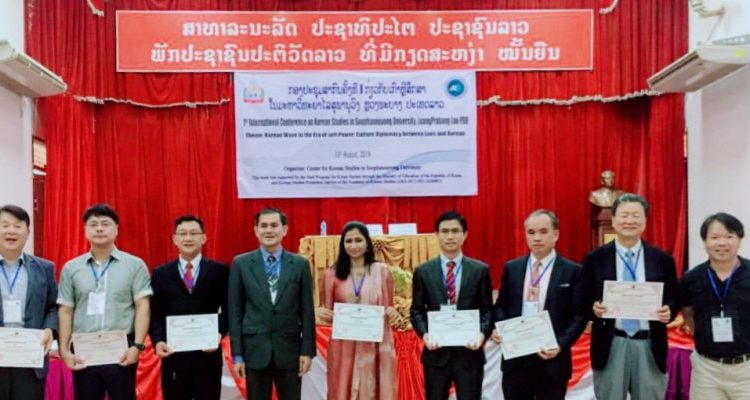India, Korea bolstering defense ties to tame rise of China: Research Paper
NEW DELHI: Spurred by a significant convergence of interests, mutual goodwill, and high-level exchanges, the India-Republic of Korea (RoK) relations have made great strides in recent years, and have become truly multidimensional. And one of the major cooperation areas is defense relations.
Nevertheless, the focus on economic relations is the need of the hour, the two Asian nations are working together to enhance their defense and military ties for peace and security in the region which is equally important since China is rising as a regional leader.
Sangeeta Yadav, the scholar-turned-entrepreneur and East Asian Countries Language and Culture expert said this in a research paper presented by her at the 1st International Conference On Korean Studies in Souphanouvong University, Luang Prabang held in Lao PDR recently.

Organized by the Center for Korean Studies at Souphanouvong University, Laos, the theme of the event was “Korean Wave in the era of Soft Power: Culture Diplomacy between Laos and Korean”.
“In this era where the world is racing to keep its prominence in Asia, India and South Korea are two partners working on their relations in a progressive direction. New Asia Initiation of South Korea and strategic partnership of India with South Korea have opened the doors of multidimensional channels for each other,” stated Yadav in her 12-page Paper. The topic was ‘Contemporary India-Korea Relations and its Strategic Importance for Regional Security’.
In recent years with this new upgraded level of partnership, these nations are working together on their economic, political and defense relations.
The Paper stated that the relationship shared by these two nations at present has been deeply affected by the policies made after the cold war era. More recently, India and Korea signed two Memoranda of Understanding (MoUs) regarding defense educational exchanges and extend logistical support to each other’s navies. It aimed to intensify defense cooperation between the two countries.
“Furthermore, India is developing strong military hardware cooperation with South Korea as the Indian Army has already inducted the K-9 Vajra self-propelled howitzers (which has roots in South Korea’s K-9 Thunder) built in partnership with the Indian firm Larsen and Toubro. It is clearly visible how India’s and the Republic of Korea’s relation has been shaped over the years,” stated the Paper.
While introducing deep-rooted historical background between the two countries, Sangeeta Yadav said that India–South Korea relations had been relatively strong for 2,000 years, although more progress arose during the past three decades.
“Korea and India share a lot of similarities in every aspect. The relationship between both countries has truly become multi-dimensional spurred by a significant convergence of interests, mutual goodwill, and high-level exchanges. The formal establishment of diplomatic ties between the two countries in 1962 enhanced their relationship with each other. These bilateral consular relations were upgraded to Ambassador- level in 1973,” Sangeeta, also a Mandarin and Korean language expert, stated in her Paper, the 6th of her at the international platform. She also happens to be the founder of Global Diction Studio.
Historical and Cultural contacts between the two nations find its roots back in the 13th century. According to “SamgukYusa” or ” Heritage History of the Three Kingdoms” written in the 13th century, a Princess from Ayodhya (Suriratna) traveled to Korea, and got married to King Kim-Suro and became Queen Huh Hwang-ok in the year 48 AD.
The more recent history of relations between India and the Republic of Korea indicates the important role of India in Korean affairs after its independence in 1945. During the Korean War (1950-53), India played a major role as a negotiator between both the warring sides as they accepted a resolution sponsored by India under the leadership of Lieutenant General K.S. Thimayya, thus declaring a ceasefire in July 1953.
Moreover, in the post-cold war era South Korean popular quest for democracy, which was introduced in 1987, created a natural affinity between the countries and in the course of time South Koreas’ open market policies found resonance with India’s economic liberalization and ‘Look East Policy’. Since then, consistent Indian support for the peaceful reunification of the two Koreas has been well received in Korea, stated Sangeeta.
These profound relations can become more embroidered as India and South Korea share similarities whether it is historical or spiritual and doesn’t have any sort of geographical disputes as compared to other nations. This friendship can go a long way in the future as India-South Korea relations have always been a win-win situation for both countries.



Thank you Sanjeev Ahuja Sir for providing a platform. And contributing ideas to my unsettled thoughts and helping in settling them so well.
your writeup really made it worth
You are being so humble.
Thanks for the kind words.